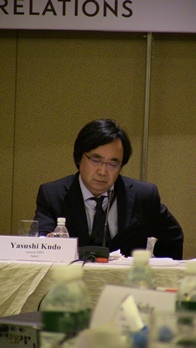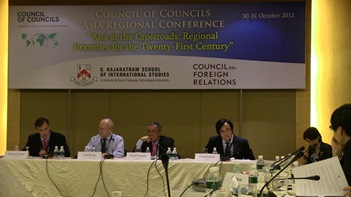Council of Councils Asia Regional Conference
Oct. 31st, 2012
Yasushi Kudo, Representative-The Genron NPO
Hello. I am Yasushi Kudo, representative of Genron NPO from Japan.

Today, I would like to talk about an issue of the East China Sea, rather than the South China Sea. This issue is also a crucial matter in Asia, so I'll briefly express my thoughts on how we can achieve a peaceful solution to the Senkaku Islands dispute (Diaoyu in Chinese), which is becoming a source of grave conflict between Japan and China.
There're differences between Japan and China regarding Senkaku islands issue, but I'm not here today to discuss these differences.
Let me clarify my basic stance on this matter. This statement expresses my personal opinions and does not represent the Japanese government's official position. But the aim of my statement is same as the government's position in that we are keen to resolve the Senkaku Islands issue.
As you know, the official position of the Japanese government is that the Senkaku Islands are under the effective control of Japan. And there's no issue of territorial sovereignty concerning the Senkaku Islands.
I agree that the Senkaku Islands are under the valid control of the Japanese government, however I do not think that there has never been an issue of territorial sovereignty over the islands.
To start with my conclusion first, I believe that China should take the case to the International Court of Justice if it insists on the legitimacy of its sovereignty claim over the Senkaku Islands.It should be a fundamental and universal rule to seek a peaceful solution to these territorial disputes on the basis of international law.
Should China take the case to the International Court of Justice, Japan should comply with the proposal by changing its conventional position.
However, I do not expect China is going to do so.
My biggest concern is that the conflict between Japan and China would have the risk of having a grave effect on peace and development in this region, and an influence decisive on the world economy.
If such should be the case, the immediate and pressing challenge concerning the Senkaku issue is to manage the conflict and to contain the dispute from Japan-China relations as a whole.
The latest territorial dispute between Japan and China was triggered by the Japanese government's purchase of the Senkaku islands. I do not consider the purchase as a wrong act. However, although its timing is another matter and Japan should have explained its reasons to China in a very careful and polite manner.
Before and during World War II, the Senkaku islets were owned by a private citizen. Since then, the Japanese government has been leasing the islets from the private owner in order to ensure their long term peaceful and stable management.
The private owner of the three islets wanted to sell these islands. Then, prompting Shintaro Ishihara who is the outspoken nationalist governor of Tokyo declared to purchase three of the Senkaku Islands. The national government is unable to block the Tokyo government's planned purchase of the islands, which is an ordinary transaction of property under domestic law.
For the Japanese government, there was no other option but to buy the islands so as to prevent Japan-China relations from being swayed by the nationalist governor and so as to put the situation under control in a rational manner.

The Senkaku Islands have been under Japan's effective control since the 19th century. In the process of normalizing Japan-China diplomatic relations in 1972, the two countries talked about the Senkaku issue for the first time, this territorial issue was made to be virtually shelved up.
Although the Japanese government does not acknowledge it as an official diplomatic agreement, the top Chinese top leaders at that time offered to leave the matter to the decision of our future generations. The then top Japanese political leaders accepted it in a posture of benign neglect. Thus, full-blown confrontation was avoided.
From the very beginning, the settlement of the issue was hard for the people to understand. In China, a majority of people are not yet informed of the fact that the islands have been under Japan's effective control.
Like it or not, many people have become aware of the presence of the dispute in the wake of the latest confrontation, thus making it hard to ties.
I have two concerns. One is there's not maritime contact mechanism between the two governments to avert an accidental incident in the ocean because I understand that China is refusing to sign it.
Another, and maybe more serious, concern is the grave repercussions on the economies of both countries. There have been attacks by some Chinese mobs on Japanese enterprises in China, and a boycott campaign continues against Japanese products including automobiles. The negative impact is seen in the area of trade.
Today, Chinese economy is slowing down in the wake of financial crisis in the Euro Zone, yet the long-term capital investment in China is sustained by an increase in Japanese investment, but many Japanese businesses are reviewing their investment in China.
Should Japan and China clash militarily or allow the conflict to drag on, the Asian economy, and the world economy would suffer grave repercussions. To avoid such a critical situation, two countries should value their mutual interests and contain the Senkaku Islands issue in a manner that will not affect the bilateral relations.
My proposal is that the Japanese government should enter consultations with the Chinese government without setting any preconditions. In any territorial dispute, the party that desires to change the status quo should avoid the use of physical force and refrain from provocative actions, while the party that maintains effective control of the disputed land or sea should accede to another party's demand for talks without conditions.
At the same time, the parties involved should reach accords in order to avert unnecessary clashes and to manage the risks involved. And they should explore the wisdom in preventing the dispute from negatively affecting the Japan-China relations as a whole.
Maybe this kind of talks would not generate a breakthrough in the deadlock directly, but it is a necessary step for the containment of the Senkaku dispute.
To overcome diverse difficulties associated with consultations of this kind, I would like to emphasize the necessity of involving private-sector dialogue on the level of "track 2 diplomacy."
We, the Genron NPO, are maintaining a high-level private-sector channel of dialogue, called the Tokyo-Beijing Forum, which falls in the category of "track 1.5 diplomacy."
In July this year, the eighth annual meeting of the Tokyo-Beijing Forum was held in Tokyo. At this meeting, the Japanese and Chinese 100 intellectuals worked out an important consensus on the Senkaku issue, the first one of its kind.
The agreement is called "Tokyo Consensus" and what we agreed was to "manage" the Senkaku issue.
The word "manage" has two meanings in this context.
One is to prevent the territorial conflict from increasing nationalism. Another is to put any clashes over the disputed islands under control. To this end, we agreed to start a public and open debate on the issue, and to set up a forum attended by experts.
Now that the actuality of the dispute has been brought to light, all we should do is to aim at finding a clear-cut and tangible solution even if it may take a long time. I firmly believe "new wisdoms" will emerge by making such rational efforts to control and contain the dispute.
Thank you for listening. (End)
Post a comment